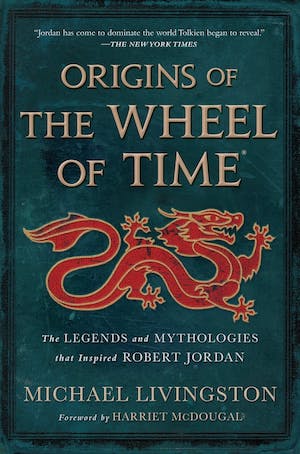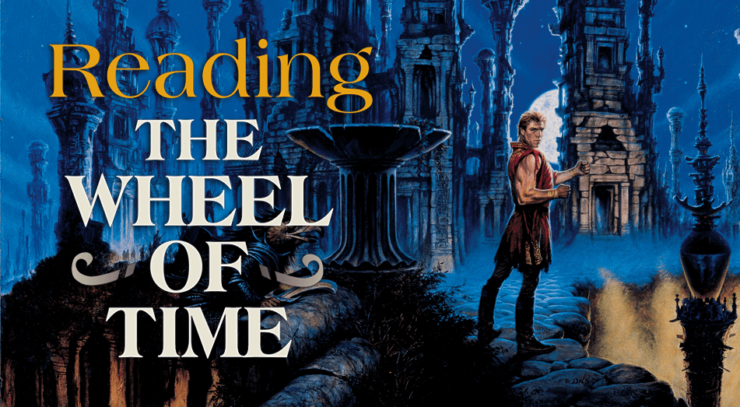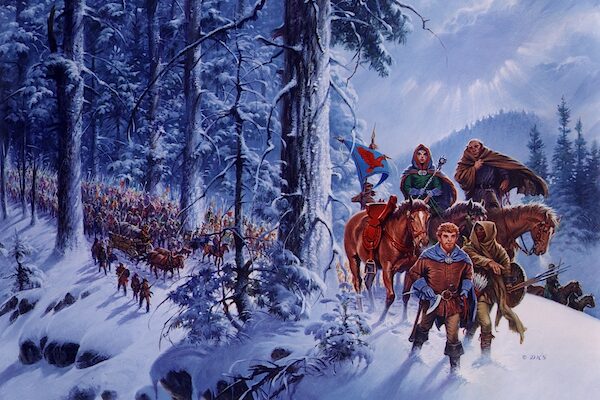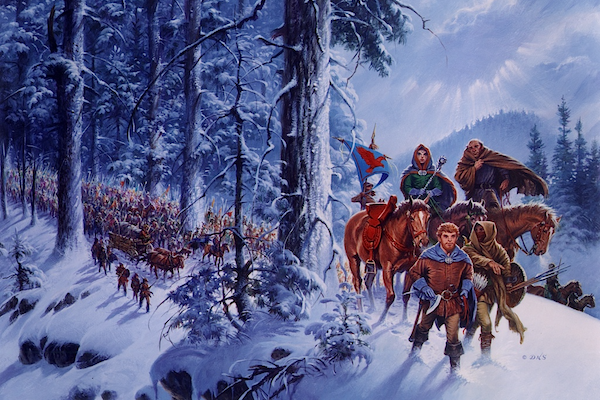You know, I kind of didn’t like the repeated windy openings at first, but I’ve really come around to them. There’s something soothing about starting a new book in the series and finding the wind there waiting for me, ready to lead me off to the beginning of this chapter in our story. Like a catechism, almost.
This week we’re covering the first two chapters of A Crown of Swords in which Perrin is worried about conflict between the various groups who came to rescue Rand and Rand is worried about all the Maidens who died in the battle at Dumai’s Wells.
A wind arises in the Braem Wood and blows north and east until it stirs a flag bearing the ancient Aes Sedai symbol. Perrin sits below the flag in the makeshift camp a mile from Dumai’s Wells and muses on the fact that it is High Chasaline, a holiday and day of reflection, during which one is supposed to remember all the good things in one’s life.
Buy the Book


Origins of the The Wheel of Time
The burden of feeling responsible for those who had died at Dumai’s Wells, both humans and wolves, weighs heavily on Perrin, as does the ongoing strife between himself and Faile. Squatting nearby, Aram complains about the indecency of the Aiel prisoners going naked, and Perrin tries to explain the gai’shain. Then Aram’s attention turns to the Aes Sedai. The three women who were stilled during Rand’s escape as well as the rest of his former captors are now under guard by the Asha’man, as are their Warders. Twice in the night the Warders had tried to break free, the attempt crushed by the Asha’man. Perrin is horrified when Aram suggests that they kill the prisoners.
“They are Aes Sedai.” Dark eyes met Perrin’s golden stare levelly. “They cannot be trusted, and they cannot be turned loose. How long can Aes Sedai be held against their will? They’ve been doing what they do far longer than the Asha’man. They must know more. They’re a danger to the Lord Dragon, and to you, Lord Perrin. I have seen them look at you.”
Perrin knows that the Aes Sedai are interested in him, a ta’veren who is tied to Rand. He forbids Aram from speaking another word about the subject, but his attention is caught by a pair of Two Rivers men having a very similar, if less direct, conversation nearby. Between this, the tensions running between all the different groups from different nations, and the presence of the Asha’man, Perrin decides that he needs to warn Rand about the powder keg they are all sitting on.
He and Aram are just mounting their horses when Loial arrives. He tells Perrin that it is wrong to keep Aes Sedai as prisoners, and also expresses distress over the tensions in the camps. He tells Perrin that someone has to do something, and Perrin reluctantly turns his horse’s head north, towards the battlefield, and Rand.
Perrin tries to avoid looking down at the battlefield below, but that only means seeing the other reminders of the fighting—nineteen graves of Two Rivers men, the hundreds of graves for the Mayeners and Cairhienin, the thousand or more for the Aiel.
He tried telling himself that they all had chosen to be here, that they had had to be here. Both things were true, but he had given the orders, and that made the responsibility for those graves his. Not Rand’s, not the Aes Sedai’s; his.
Perrin makes his eyes move down towards the battlefield, the scent of which has been in his nose the whole time. Now he confronts the sight of the bodies, and the carrion birds swirling over the dead Shaido. Rand is down there too, with a group of soldiers, Aiel, and, of course, Asha’man. As Perrin rides closer he catches sight of Min with Rand, walking close and talking with him as he steps through the bodies, sometimes stopping to examine one.
Suddenly Perrin realizes that Kiruna and Bera have joined him, demanding to know what Rand is doing. The rest of the Aes Sedai, including Verin and Alanna, are standing a little way away, along with lounging Asha’man who are pretending not to be guards. Perrin lies and says that he doesn’t know, but privately he suspects that Rand is looking for all the Shaido Maidens. The night before he had stumbled across Rand, sitting away from the rest of the camp and rocking back and forth in the dark, muttering about the Maidens who died for him, and the promises he has to keep no matter how much it hurt. Perrin had stayed with Rand, listening to Rand recite the names of every Maiden who died, hoping Rand could hang onto sanity.
Now, he keeps Rand’s secret, and Kiruna is clearly annoyed at not getting the answer she wants. She suggests Perrin have his men shoot the carrion birds, some of which must be spies for the Dark One. Perrin sharply retorts that there are too many to get all of them. He points out that there has been enough killing, and upbraids her for not following his orders yesterday in the battle, bringing more men with them to be killed in the fight.
He can smell the affront on the Aes Sedai, though she is calm as she points out that the Three Oaths would not allow them to channel into the battle unless they themselves were in danger. Perrin knows that what she is saying is true, but also that the Aes Sedai have a way of manipulating things to be the way they want. They were certainly hoping to reach Rand before anyone else.
Rand comes up with his entourage. Perrin goes to him, but Kiruna and Bera reach him first, telling Rand he needs Healing, while Amys, Sorilea, and Taim all talk over each other as each attempts to be put in charge of the Aes Sedai. Kiruna is certain that Coiren will give Kiruna her parole, but the others begin arguing about the Aes Sedai’s lack of honor and trustworthiness until Rand shouts to quiet them. After a long pause, he declares that the Wise Ones will take charge of the Aes Sedai, cutting off Taim’s protests. When Kiruna tries to argue as well, Rand reminds her that she swore fealty to him. Perrin notes that she looks just as disbelieving as she had yesterday.
Rand tells Kiruna and Bera that they are not allowed to do anything without a Wise One’s instruction. Bera replies that the oath they took was sufficient to hold anyone but a Darkfriend, and asks if that’s what Rand thinks they are.
“If I thought that,” Rand snapped, “you would be on your way to the Black Tower with Taim. You swore to obey. Well, obey!”
Bera stalks away, but Kiruna asks if they may have permission to Heal Rand. She makes it sound more like an order than a question. Min urges Rand to accept, and Sulin and Nandera tease him for being a fool. Rand relents, though his face is stoney as he tells Kiruna that he will accept, but only from Alanna.
Shockingly, Rand cupped Alanna’s chin, turning her face up. There was a hiss of indrawn breath from Bera, and for once, Perrin agreed. Rand would not have been so forward with a girl at a dance back home, and Alanna was no girl at a dance. Just as surprising, her reaction was to blush and smell of uncertainty. Aes Sedai did not blush, in Perrin’s experience, and they were never uncertain.
Rand orders her to Heal him, and when it has been done he turns away from her without another word. Sorilea and Amys herd the Aes Sedai away, and Rand and Taim begin arguing about Rand having an honor guard. Rand will only accept four Dedicated and four soldiers, along with one full Asha’man that he picks out seemingly at random. Taim doesn’t like the choice. He tells Rand that Dashiva is gaining power rapidly but that he is either a dreamer or already touched by the taint. Still, Rand holds firm and Taim eventually relents.
Once the Asha’man have gone back to the Black Tower, Perrin goes to Rand and tells him everything he has observed between the different groups of Rand’s allies, and the feelings towards the Aes Sedai prisoners. He admits that he believes many would help the Aes Sedai escape, or worse, and Rand implies that killing wouldn’t be that much worse. Perrin answers that he won’t be part of murder, and he will stand in Rand’s way if he has to. Min tells the both of them off, reminding them that they both know Rand would never give such an order. Rand points out that, dead or alive, the Aes Sedai are a millstone on his back and that they just may break it.
Rand asks Min about her visions, and Perrin is startled to find out that all the Aiel know about them now, and how she is sort of an honorary Wise One now. Unfortunately, with so many channelers packed together, and some of them actively wielding the One Power, Min can’t see anything clearly—it’s all a muddled blur. Still, she feels like there is something important there, if only she could pick it out.
Finally, Loial arrives to tell Rand that everyone is ready to depart. He also brings up that Rand promised to tell him about the battle while it is still fresh in his mind. Rand promises that he won’t forget—the memory will still be fresh when he tells it. Perrin reflects that Loial always acts like he missed the action, especially when he was in the thick of it. Rand asks Dashiva if he can make a gateway. Dashiva answers that “the M’hael” teaches traveling as soon as the student is strong enough. Rand asks about the title.
“The Lord Mazrim Taim’s title, my Lord Dragon. It means ‘leader.’ In the Old Tongue.” The fellow’s smile managed to be nervous and patronizing at the same time. “I read a great deal on the farm. Every book the peddlers brought by.
Rand clearly disapproves, but merely tells Dashiva to make a gateway to near Cairhien. It is time to go see what the world has been up to in his absence, and what he will have to do about it.
Why do I have the feeling that, despite how relatively quickly Perrin and the rest were able to rescue Rand, he’s going to find that at least some of the White Tower’s manipulations won’t be easy to undo. His foothold in Andor always felt particularly precarious, given how many of the nobles only gave him support because of his promise to put Elayne on the throne. He wasn’t able to keep that promise in a timely fashion, and then he disappeared—there is every chance that that tenuous support has crumbled and that he won’t exactly be welcomed back. Colavaere had already started her political maneuvering when Perrin left to chase after Rand, and she might not be the only one. Dyelin had the most supporters and she supported Elayne, so there’s also a good chance some of Rand/Elayne’s allies will still be holding onto the Lion Throne for her. Them.
I really enjoyed the framing device of Chapter One. High Chasaline is a day when you are supposed to focus on the good things in life, while complaining can bring bad luck. Perrin does have much to be grateful for—he’s alive, Rand is alive and safe, and although the casualties of Dumai’s Wells were great, they were nothing compared to what they could have been if the Asha’man hadn’t shown up. And I think he is grateful, but gratitude can’t erase his pain over those who died, especially the wolves. After all, the wolves would have never been involved if Perrin hadn’t called them—as the other wolves point out. Also, while he struggles to see the good, Perrin doesn’t complain—he is stoic about what he has to do, even if it hurts.
I really felt for Perrin in these chapters. I was also cognizant of the ways in which he was taking on a little more of that burden than I felt he should. Yes, everyone who died in that battle was following his orders, but they didn’t die because he made a mistake or required something unreasonable of them. Perrin even acknowledges that they all chose to be a part of the battle and that their presence was a necessity—and yet he believes this makes no difference when it comes to carrying blame for their deaths. He even considers himself more responsible for those graves than Rand, the person they all came to rescue, or the Aes Sedai who kidnapped Rand, even though they are the whole reason the battle had to be fought at all. I doubt Rand would agree with Perrin’s assessment, though he’d be happy to take on that guilt instead.
Of course, we know the way Rand handles his own feelings of responsibility for the deaths and injuries incurred under his name and banner. He is constantly hating himself for becoming hard, for thinking of people as tools and knowing that he will send many men to their deaths, even as he acknowledges that he has no choice, and that the fate of the entire world is on the other side of the scale he is holding.
And of course, there’s also his feelings about the Maidens—a special case, since his guilt over their deaths is so severely heightened by Lews Therin’s guilt over Ilyena’s death. I must say, the little flashback where Perrin encountered Rand rocking back and forth and reciting the names was heartbreaking, but also kind of a relief in a way. Perrin can’t do anything to help, and Rand probably doesn’t feel any better, but it still felt right to me that someone who loves Rand should be there in that moment, silently keeping him company and bearing witness to his pain. Most of the characters in this story carry their pain silently, hiding it from others, and Rand has a greater burden than anyone. He’s still alone, but in that moment, he was a little less alone.
Much of The Wheel of Time is devoted to this question of when violence is warranted or necessary, and what toll it takes on the ones enacting it, and in these chapters we see three men who have three very distinct reactions to the violence they have felt driven to participate in. Rand is the first. Then there is Perrin, who probably has the healthiest attitude of the three because he has Elyas’ advice to steady him. (And Faile’s too, until she started being such a—well, that’s neither here nor there.) I think the advice Elyas gave Perrin about the axe—that he should throw it away if he ever comes to like using it—probably also applies to Perrin’s attitude towards his responsibilities as a leader. If it ever becomes easy to shrug off the deaths that happened under his command, then it probably means something is very wrong… as it seems to be with Aram.
It has been interesting, though heartbreaking, to watch the young Tuatha’an transform from a follower of the Way of the Leaf, to a skilled swordsman, to… well, whatever he is now. Aram showed eagerness for a fight in Lord of Chaos, but his attitude in this chapter is something different even than that. Perrin notes that he can’t smell any anger or strong emotion in Aram when the Tinker suggests executing all the Aes Sedai prisoners, nor can he smell any when he sternly tells Aram to drop the subject. And then Aram smiles when he sees the battlefield that Perrin and Loial can barely stand to look at. The man has gone far past the realization that the Way of the Leaf doesn’t work for him anymore—he seems delighted by death now, eager not just for a fight but for the aftermath of it. This is an important distinction, I think, especially in a world where battle and violence are commonplace. Many soldiers we have encountered in The Wheel of Time have a very stoic and practical view on the necessity of killing and the possibility of their own deaths. Some even enjoy violence, but we don’t usually see non-Darkfriends who are this pleased by the sight of death.
There are some, though. Niall ordered killings to frame Rand and turn public opinion against him. Most of the Whitecloaks would happily execute any Aes Sedai they could get their hands on. And we saw Sevanna’s eagerness at ordering and witnessing Desaine’s murder. I’m also quite confident that Elaida would have happily tortured Siuan until she got every ounce of information out of her and then witnessed her eventual death with joy. There’s also Valda’s slaughter of the Tinkers.
…Okay, I guess there are a fair amount of non-Darkfriends who delight in killing. But in most of these examples—Valda excluded, which is why I hate him the most—there is at least a personal angle or logical motivation, however dark and twisted, at the root of the violence. The Whitecloaks believe that the Aes Sedai are Darkfriends. Niall is making political moves. Sevanna kills for power and prestige, as does Elaida, and because they feel slighted by those they want to harm. Which is plenty bad, but Aram has no connection to any of those who died at Dumai’s Wells.
Granted, we have never had a section from his POV, so it’s possible that he has some trauma around an encounter with an Aes Sedai (perhaps a Red?), but that feels like a stretch. It will be interesting to see if Aram actually feels loyalty or attachment to Rand—he did argue that the Aes Sedai were dangerous to Rand, but he was also worried about Perrin, to whom he is very attached—or if he’s as ambivalent to the Dragon Reborn as he seems to be to most other people.
I can’t help thinking about how the Tuatha’an and the Aiel share a common ancestry through the Da’shain Aiel. The journey that Aram is going through now is very similar to those we saw through Rand’s eyes as he relived his ancestors’ experience of the Breaking—being driven to violence by a need to defend himself as his family and friends were mercilessly slaughtered. But Aram was alone, with no others of his people choosing to walk the path with him; each group of Aiel who eventually left the Way of the Leaf did so in at least small groups.
It also feels like there is something very symbolic in the fact that, although the Aiel are a warlike people, they still refuse to use swords, while a sword is exactly what Aram chose. The veiling and the abhorrence of swordplay are remnants of the Aiel carry of the Da’shain Aiel, while the Tuatha’an have the Way of the Leaf. Aram has no remnants left to him, and perhaps that is part of the reason he seems to have become unmoored from any real sense of morality or emotion.
I was also noticing that both Rand and Perrin have a man attached to them who seems loyal, but is also clearly dangerous and probably going to be a problem down the road. Taim is clearly not as much on Rand’s side as he claims to be—the man said he wanted to be the Dragon Reborn because he wanted glory, and he’s clearly not content with the amount he’s getting, even as the teacher at the Black Tower and Rand’s de facto second in the ranks of the Asha’man. Giving himself the title of The M’Hael looks very much like a bid to raise himself even further above the other Asha’man. And I have to admit, it kind of reminded me of how all the Forsaken are desperately trying to claim the title of Nae’blis—head ruler under the Dark One.
I just can’t trust anyone who’s that power-hungry, and I think it’s good that Rand doesn’t trust him either, even if part of that is Lews Therin’s betrayal paranoia. Just because he’s paranoid, that doesn’t mean he’s wrong!
I wonder how the Aiel concept of death affects how they feel about killing. They have a very pragmatic view of violence and of dying, and perhaps part of that comes from seeing their life as a dream they eventually wake up from. We even see Rhuarc take comfort and strength from the words “life is a dream,” when he is about to head into a battle he can’t really imagine winning. This philosophy—seeing life as transient and suggesting that there is something greater, or at least different, to “wake up” to—probably makes dying seem less tragic, and by extension, makes being the cause of death seem less horrible.
I also have so many questions about how Rand’s ta’veren powers are affecting the bond between him and Alanna. We’ve seen other Aes Sedai struggle with the effects of losing their Warders, the way it makes them unsteady, uncertain of themselves, and unable to hide their emotions. It’s such a profound experience to have a bonded Warder die that even the Aes Sedai are sympathetic and accommodating to a sister who has experienced such a loss. Usually, the Aes Sedai either quell (see: how they treat Alanna like a child because they’re disgusted by her non-consensual bonding of Rand) or ignore (as Perrin observes with the treatment of the three stilled sisters) things that they don’t like to see, and emotional outbursts from fellow sisters are fairly high on that list, I think. But I digress—the point is that, while Alanna also lost a Warder (which may be one of the reasons she impulsively bonded Rand in the first place) and was struggling for a while, it seems like there’s more at work here.
She’s admitted that she can’t use the bond to compel Rand, which is apparently unheard of for the Aes Sedai. And it makes sense that Rand’s power to compel people and situations to be what he needs them to be—or rather, what the Pattern needs them to be—would be stronger than a bond placed on him by any Aes Sedai, especially a modern one with relatively little strength in comparison to the Aes Sedai of the Age of Legends. But not only can she not compel him, he may very well be compelling her with his ta’veren nature, perhaps even directly through the bond. After all, the bond also creates intimacy and closeness between Warder and Aes Sedai, and while Rand has carefully hardened himself against that connection, Alanna probably didn’t think to do so. Maybe she couldn’t have even if she had wanted to.
Feeling this connection to Rand and also having no control over what the bond does could very well result in the uncertainty, blushing, and malleability that Perrin observes in her. And honestly, I feel bad for Alanna. What she did to Rand is several shades of not okay, but so far she has gotten the worse end of the deal, I think, and Rand’s dismissal of her hurt to read, even though I completely understand it.
Next week we will cover Chapters 3 and 4. In the meantime, I will leave you with a joke I randomly came across on the internet.
What do you get when you teach a wolf to meditate?
Aware wolf.
Thank you I’m going to go lie down now.












